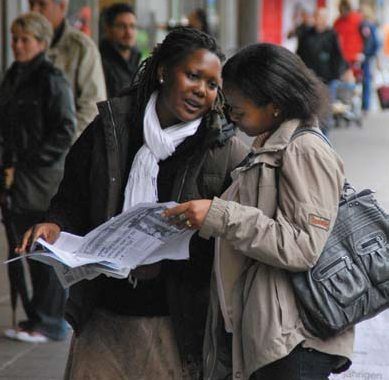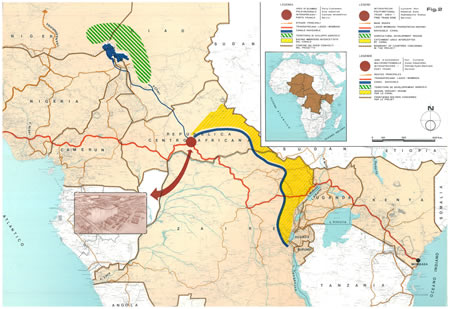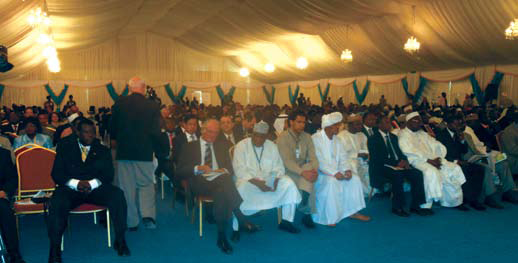Schiller Institute Intervention at Ndjamena, Chad Forum
Schiller Institute Brings
NAWAPA Approach to Chad
November 2010
Preliminary Report: Schiller Institute Intervention at Ndjamena, Chad Forum to "Save Lake Chad"
This article appears in the November 12, 2010 issue of Executive Intelligence Review and is reprinted with permission.
At the "8th Forum for Sustainable Development," which took place October 29-November 1 in N'Djamena, Chad, the capital of one of the poorest countries in the world, devastated by wars and famine, the conference theme, "Save Lake Chad," seemed most appropriate. This international conference was jointly organized by the French government, through the environmentalist think-tank Passages-Adapes, and the Chad government, and drew thousands of participants from Africa, Europe, the United States, and the Middle East.
|
The Schiller Institute’s vice president in Germany, Portia Tarumbwa-Strid, upset the malthusian agenda of the “Save Lake Chad” conference in N’Djamena, by insisting on a program to develop the region for the benefit of the human population. Here she is shown (left) organizing in Germany. |
What was apparent from the very beginning was the overwhelming presence of the fascist environmentalist agenda within the European pseudo-scientific community, which geared the debate towards discouraging the Transaqua project[1] for refilling Lake Chad from the Oubangui River, a tributary of the Congo River, as too expensive and having negative effects on biodiversity. Roland Pourtier, the head of the Association of Professors, even called for removing the taboo against malthusianism!
But happily, two Schiller Institute representatives from Europe, Portia Tarumbwa-Strid and Sébastien Périmony, were on the scene to vigorously represent the opposite view: that what Africa urgently needs are great projects for infrastructure development, along the lines of the proposed North American Water and Power Alliance (NAWAPA) and the Transaqua program for African water projects.
Lake Chad: Africa's Patrimony
Lake Chad is located about 100 km northeast of N'Djamena, straddling the borders of Chad's Nigeria, Niger, and Cameroon. It provides the source of livelihood for 30 million people, 20 million of whom are immediately threatened by starvation, if nothing is done to strengthen food security in the region.
The problem is that Lake Chad is drying up. Forty years ago, it covered 25,000 km2, and now it has been reduced to less than 10% of its former size, a mere 1,500 km2. The effect of the disappearance of the lake as the people's main source of income—fishing—became a main topic of the conference. But instead of talking about large-scale inter-water-basin transfer programs as the solution, the increase of the human population over the years was held accountable for putting increased pressure on the "ecosystems." Thus it was declared that the lake should become an international protectorate in order to conserve the remaining water.
One look at the streets of N'Djamena, however, should have been enough to melt the hardest of green-fascist hearts. Ecosystems, biodiversity, and mating patterns of birds aside, the plight of the people living in Chad was heart-breaking. There was no running water or electricity, and each household had to buy gas canisters and water drums every day. Every species of insect imaginable crawled the streets, while the people eked out a meager living trying to sell fly-infested vegetables, fish, or trinkets along the side of the road. The children roamed the dusty streets collecting empty plastic bottles and wearing hand-me-down clothes. They did not go to school.
Anyone with half a brain must understand that there is something terribly wrong with the fact that the beautiful people living in this huge country (at least three times the size of Germany), filled with mineral deposits of oil, uranium, iron ore, and bauxite, just to name a few, has been condemned to poverty. There could be absolutely no explanation for this affront to the dignity of man, unless the deeper implications of the environmentalist agenda become apparent—as they did at the conference.
Tackling the Green Fascists
The conference itself was in two parts. Six scientific panels took place on Oct. 29-30, and on Nov. 1, five heads of state from the Central African Republic, Chad, Nigeria, Libya, and Senegal were present for the political segment, along with delegations from other countries on a ministerial level.
Most of the scientists from Europe, especially from France and Germany, were convinced that because of the depletion of the underground aquifers of the Lake Chad basin, large-scale water management projects such as the Oubangui-Chari transfer, proposed by the Commission of the Lake Chad Basin (CBLT), would have a negative environmental impact. This was countered by the African scientists, who complained that the age-old discussion of water-transfer was now being called into question at a time when the hunger crisis necessitated the immediate implementation of the only long-term solution available—using the abundant adjacent waters of the Congo River basin.
Portia Tarumbwa-Strid, vice president of the Schiller Institute in Germany, was invited to speak at the final scientific panel, on "The Future of the Lake and Opportunities for Sustainable Development." The other panelists unabashedly discussed "global warming," even though the scandals that had emerged in and around the Copenhagen summit last December had shown man-made global warming to be a fraud. Nonetheless, the mantra of conserving biodiversity and the evils of human population growth prevailed. No one even talked about the fact that the growth in population in the Lake Chad region was the result of immigration of people from the surrounding countries who were searching for a better standard of living.
Tarumbwa-Strid began her intervention with the global strategic situation and financial breakdown crisis:
"Africa today is standing at an historical crossroads, and it is impossible to take any form of policy decision for Africa outside of the global strategic context. Because 39 months into the international financial crisis, the decision of governments around the world to print massive amounts of money in order to bail out speculators who lost money in high-risk speculation has led to a situation where the gap between rich and poor is growing, and the number of billionaires, as compared to the now over 1 billion starving people around the world, is intolerable. Three-quarters of those who have to survive on less than one meal a day live in Africa, and this has a direct relationship to the increase in speculation on commodities, especially on food and raw materials, that has seen the prices of staples increase to a level only comparable to 2008, when riots broke out in over 40 countries, mostly in the developing sector."
This was the only presentation which discussed the international financial crisis. The eyes of the participants looked like they were going to burst out of their sockets! But besides the apparent aggravation on the faces of the Europeans, the African and Arab delegations could barely conceal their delight, especially as the presentation continued to discuss NAWAPA and the Eurasian Land-Bridge as the basis for the development perspective of the real physical economy of Africa for the next 50 to 100 years, with the Transaqua project.
Tarumbwa-Strid continued:
"By transferring 100,000 million m2 of water from the tributaries of the Congo River basin, and bringing this freshwater to Lake Chad, water that would otherwise run off into the Atlantic Ocean, it would be possible to irrigate up to 17 million acres of land and provide food security for almost 100 million people."
She then showed the development of a continental magnetic levitation railway system, and of the fourth-generation nuclear reactor, the inherently safe high-temperature reactor, in nuplex cities, as the only way to make Transaqua possible.
The contrast was so huge, that dozens of people came up afterwards to receive a copy of the dossier "Africa: The time has come for great projects," published in French as part of the 2012 Presidential campaign of LaRouche associate Jacques Cheminade, as well as a DVD with material in English, French, and Arabic on the international reconstruction program of the Schiller Institute.
The Italian delegation was familiar with the Transaqua project, and was visibly overjoyed that somebody had finally put it on the table. One of the ministers of the Central African Republic had wanted to focus her presentation on Transaqua, but was advised against it! An engineer from Nigeria, who had already intervened on the previous day, demanding to know why Transaqua had not been put on the agenda, was so happy to hear the presentation, that he organized a meeting with the Schiller Instiute team and the rest of his delegation to discuss it further.
He explained that he had been one of the first engineers to broach the subject with his own government after he had heard of Transaqua, and appealed to the government to approach the other relevant governments, to come to an agreement on the issue. He was even surprised when Mobutu Sese Seko, who was then the President of Zaire, agreed to it in 1987, because it seemed like the dream was about to come true. Unfortunately, Bonifica, the Italian engineering company that had proposed Transaqua, was dissolved, as part of a change in government, and the other Europeans told the new government that it was too expensive. This was how the smaller project for water transfer from the Oubangui River to the Chari River was adopted.
The Malthusian Agenda
On the third and final day of the conference, the political segment of the forum convened with President Idriss Déby of Chad, President Abdoulaye Wade of Senegal, President Dr. Goodluck Ebele Azikiwe Jonathan of Nigeria, President François Bozize of the Central African Republic, and Libyan leader Muammar al-Qaddafi. The top brass from diverse other African countries were also there.
|
The drama began when the lights suddenly went out for a quarter of an hour during President Wade's speech—they were using solar-powered generators! The charade around green energy became all the more ridiculous, when a nine-year-old girl began to recite a speech on the evils of man-made global warming, and received the applause of the whole audience. The sinister intention behind this show became more and more clear. The final communiqué of ministers announced that they were going to bring up the issue of saving Lake Chad at the Climate Change summit in Cancun, Mexico, in December, to gain financial support from the rest of the world for declaring Lake Chad an international protectorate of biodiversity!
The Schiller Institute delegation managed to polemicize against this at the press conference, intervening once again to bring reality on the table. Sébastien Perimony, who is with the Cheminade in 2012 Presidential campaign, addressed a question to President Deby on the bankruptcy of the world financial system, and posed the paradox that here they were looking for funds for development, while other parts of the planet were giving trillions of dollars to bankrupt banks. Therefore, the problem could not be the money, but rather the system itself. Périmony asked him if he was ready to adopt a top-down approach, as the Schiller Institute had presented during the conference, and go for a real physical economic recovery with the Transaqua project.
The President gave a very beautiful answer about future generations, but said nothing on the crisis. President Wade, however, asked to answer the question too, saying that he had written a paper for the Financial Times during the subprime mortgage crisis, saying that the bailout policy was not the right thing to do. Unfortunately he went back to the rules of the game and started talking about limiting the intervention of man around Lake Chad, repeating the mantra of the green fascist ideology.
Despite this, the concept of biospheric engineering was very well received by the serious people there, particularly the delegations from the Central African Republic and of Congo-Brazzaville, with whom the Schiller Institute team met. They were intrigued by the idea that most parts of Western Europe, which were developed, were not kept "natural," but rather man had intervened to bring trees, buildings, factories, power plants, and trains to areas which had been barren or swamp-infested such as the Ruhr region in Germany.
In other private discussions in and around the conference, there was high recognition from the U.S. delegations of Lyndon LaRouche and the Glass-Steagall mobilization; the French delegations all knew about Jacques Cheminade. The Germans were rabidly against large-scale infrastructure projects, and even denied that there was a hunger crisis in Niger and Chad! The fact that there were no delegations from Russia, China, or India proved to be the reason that the European pseudo-scientists could demonize great infrastructure projects. That is why LaRouche's proposed Four-Power agreement (the United States, Russia, China, and India) is the only way to implement the Schiller Institute's vision for a dialogue of cultures, through great infrastructure projects as a means of worldwide reconstruction of the physical economy.
For us here in Europe, however, since the solution to the world financial crisis will not be initiated from here, the issue therefore becomes one of a fight against the rotten environmentalist ideology, which cares more about saving dried-up worms and insects, than human beings.
I will quote a young man from N'Djamena, whom we met just before leaving Chad. He said:
"We need a radical solution right now! And you're right: Only with nuclear power can we become free. We cannot do anything without energy, and we're not children who cannot handle high technologies."
He is waiting for us to win this fight!
[1] See Dr. Marcello Vichi, "The Congo-Chad Water Transfer: The Main Features of a Feasibility Study," EIR, Oct. 8, 2010.



